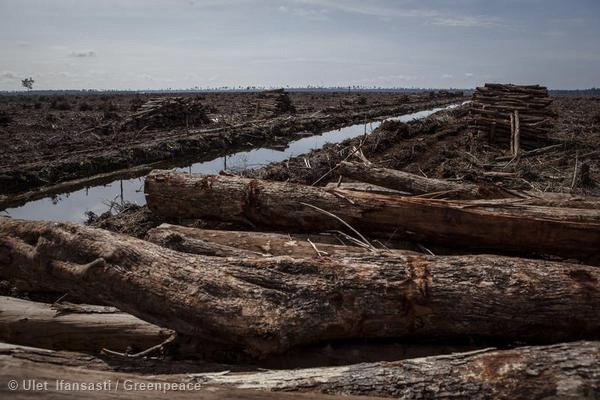
Excavators beside a canal cutting through recently deforested peatland. © Ulet Ifansasti / Greenpeace
A year after it pledged a dramatic shift in how it operates in Indonesia’s fast dwindling native habitats, Asia Pacific Resources International Ltd (APRIL) continues to destroy forests and peatlands in Sumatra, allege environmentalists.
On January 28th, 2014 — just days before APRIL’s biggest competitor Asia Pulp & Paper (APP) was to provide an update on its own efforts to reform its forest management practices — APRIL announced a sustainability policy that it said set a new standard for Indonesia’s pulp and paper sector. APRIL claimed its policy was backed by WWF, one of its chief critics, and did more to protect forests than APP’s commitment.
APRIL’s claims were quickly refuted by environmentalists. WWF rebuked the forest giant, stating that its policy allowed conversion of natural forests for industrial timber plantations, while investigative work by other groups like Greenpeace and Eyes on the Forest confirmed that APRIL was indeed continuing on a business-as-usual path, destroying deep peat forests on Padang island.
A year later, very little seems to have changed, say green groups.
“After one year, we really do not see the significance of their policy. The commitments and the realities do not make sense. They are simply implementing business as usual,” said Muslim Rasyid, Coordinator of Jikalahari, one of the local NGOs that is part of the Eyes on the Forest coalition. “APRIL in 2011 already told Government its expanded pulp mill would no longer source any MTH by the end of 2014. APRIL should simply realize that plan.”
“We question the real conservation benefit of the implementation of this policy. APRIL’s HCV protection process continues to be flawed and NGOs continue to find natural forest clearance and canal developments by APRIL without HCV Resource Network peer-reviewed assessment,” added Aditya Bayunanda of WWF-Indonesia.
Greenpeace images released last month showed that APRIL affiliate Riau Andalan Pulp & Paper (RAPP) cleared thousands of hectares of rainforest in its Padang island concession between its announcement and November 2014.

Piles of rainforest logs next to a drainage canal in Nov 2014. Photo courtesy of Greenpeace
Also last month, Greenomics-Indonesia revealed that after consultation with the “stakeholder advisory committee” established under its sustainability commitment, APRIL proposed reclassifying some conservation zones within its concessions for conversion to pulpwood plantations. Greenomics says the Ministry of Forestry rejected that request.
In contrast, APP has stepped up its sustainability commitment over the past year, pledging to support forest protection and restoration as well as agreeing to a high-profile audit by Rainforest Alliance, a group that was publicly burned by APP in the past. The results of that audit will be released this week.